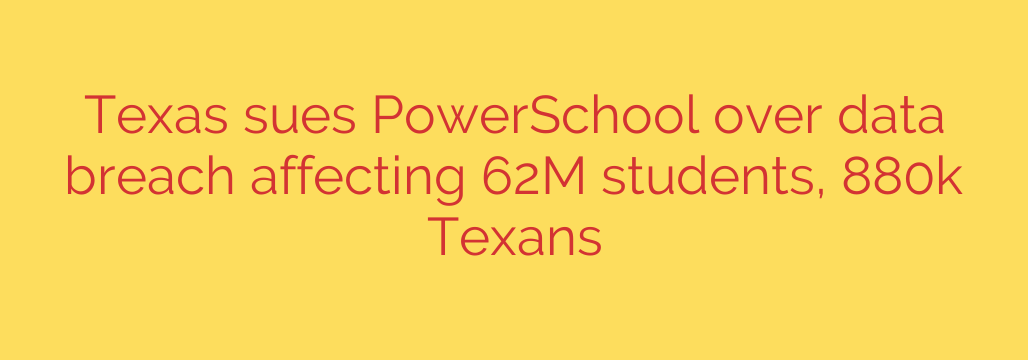
Texas Sues PowerSchool Over Massive Student Data Breach
A sweeping lawsuit has been filed against PowerSchool, a major provider of educational software, following a massive data breach that exposed the personal information of millions of students across the country. The state of Texas is taking legal action, alleging the company failed to protect the sensitive data of an estimated 880,000 Texas students and their families. Nationally, the breach is believed to have impacted as many as 62 million students.
The legal action claims that PowerSchool violated state law by failing to implement adequate security measures and not providing timely notification after the breach was discovered. This incident highlights the growing concern over the security of student data stored by third-party educational technology companies.
How Did the Breach Happen?
The investigation revealed that the breach originated not directly from PowerSchool’s systems, but from a third-party cloud-storage vendor named Snowflake. According to the lawsuit, hackers gained access to a PowerSchool database hosted on Snowflake’s platform by using compromised login credentials.
Texas alleges that PowerSchool was aware of the security vulnerabilities but failed to implement reasonable security measures to safeguard the vast amounts of student data it managed. The lawsuit contends that the company’s security protocols were insufficient to prevent unauthorized access, leaving the personal information of children vulnerable to cybercriminals.
Key allegations in the lawsuit include:
- Inadequate Security: The company allegedly did not enforce multi-factor authentication or other critical security controls that could have prevented the breach.
- Delayed Notification: PowerSchool is accused of an unreasonable delay in notifying school districts and affected families, preventing them from taking immediate steps to protect themselves.
- Deceptive Practices: The lawsuit argues that PowerSchool violated the Texas Deceptive Trade Practices Act by misrepresenting the security of its platform and failing to uphold its responsibility as a data steward.
The Real-World Risks for Students and Families
The information exposed in this breach is highly sensitive and could have long-term consequences for the affected students. When personal data like names, dates of birth, and school information falls into the wrong hands, it creates a significant risk for:
- Identity Theft: Children are prime targets for identity theft because their credit histories are clean slates, and fraud may not be discovered for years.
- Targeted Phishing Scams: Criminals can use the stolen data to craft convincing emails or messages directed at parents or students to steal more information or money.
- Future Fraud: A child’s compromised data can be used to open fraudulent accounts, apply for loans, or commit other crimes long before they are old enough to realize it.
The lawsuit seeks to hold PowerSchool accountable for these failures and to secure penalties that will deter similar negligence in the future. It underscores a critical message: companies entrusted with the data of our children have a profound obligation to protect it.
How to Protect Your Family’s Information
While the legal process unfolds, this incident serves as a crucial reminder for all parents to be proactive about digital security. Here are several actionable steps you can take to safeguard your family’s data:
- Be Vigilant About Phishing: Be suspicious of any unsolicited emails or messages asking for personal information, even if they appear to come from your child’s school. Look for spelling errors, unusual sender addresses, and urgent calls to action.
- Talk to Your School District: Ask your local school officials what educational software vendors they use and inquire about their data security and privacy policies. Understand who has access to your child’s information and how it is protected.
- Consider a Credit Freeze for Your Child: You can place a protective freeze on your child’s credit file with the major credit bureaus (Equifax, Experian, TransUnion). This prevents anyone from opening a new line of credit in their name.
- Practice Good Password Hygiene: Use strong, unique passwords for any school-related online portals. Enable two-factor authentication (2FA) whenever it is offered, as it provides a critical extra layer of security.
The digital age has brought incredible tools into the classroom, but it also carries significant responsibilities. As this case demonstrates, ensuring the safety and privacy of student data must be a top priority for schools, technology partners, and families alike.
Source: https://www.bleepingcomputer.com/news/security/texas-sues-powerschool-after-massive-data-breach-hit-62-million-students/








